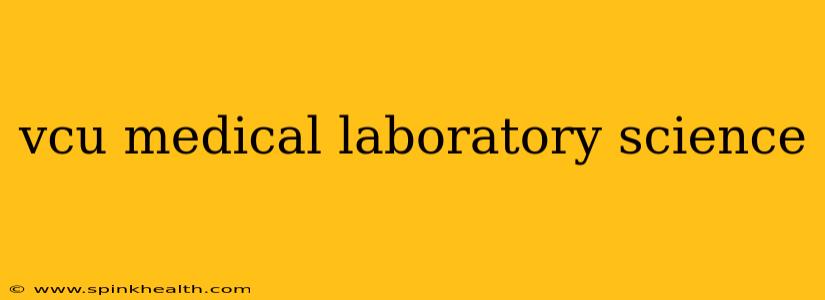The hushed reverence of a medical laboratory, the quiet precision of a technician, the life-altering impact of a single test result – this is the world of Medical Laboratory Science (MLS), and at Virginia Commonwealth University (VCU), it’s a world meticulously crafted for excellence. This isn't just a career; it's a calling, a commitment to the intricate dance between science and healing. Let's delve into the intricacies of VCU's Medical Laboratory Science program and what it takes to become a vital part of this crucial field.
What is a Medical Laboratory Scientist?
Imagine being the silent guardian, the unseen detective, uncovering the invisible clues that lead to diagnosis and treatment. That's the role of a Medical Laboratory Scientist. We’re not talking about lab coats and beakers alone; we’re talking about advanced technology, intricate analytical skills, and a deep understanding of human biology. These professionals analyze blood, tissue, and other bodily fluids to detect diseases, monitor treatment effectiveness, and help guide critical medical decisions. They are the bedrock of modern healthcare, working behind the scenes to ensure accurate and timely diagnoses.
What Makes VCU's Medical Laboratory Science Program Stand Out?
VCU's MLS program is renowned for its rigorous curriculum, state-of-the-art facilities, and dedicated faculty. It's not just about memorizing facts; it's about fostering critical thinking, problem-solving skills, and a profound appreciation for the ethical considerations involved in healthcare. Students gain hands-on experience in a variety of laboratory settings, working with sophisticated equipment and collaborating with experienced professionals. This immersive approach ensures graduates are well-prepared to navigate the dynamic landscape of medical laboratory science.
What Courses Are Included in the VCU Medical Laboratory Science Program?
The curriculum is a comprehensive blend of theoretical knowledge and practical application. Expect a rigorous exploration of hematology, immunology, microbiology, chemistry, and molecular diagnostics. Students will delve into advanced techniques like flow cytometry, molecular diagnostics, and next-generation sequencing, gaining expertise in the latest advancements in the field. The program isn't just about the science; it also emphasizes effective communication and teamwork, crucial skills for success in any healthcare setting.
What are the Admission Requirements for VCU's Medical Laboratory Science Program?
Gaining entry into VCU's competitive MLS program requires dedication and preparation. A strong academic foundation, particularly in science courses, is essential. A high GPA, relevant coursework (like biology, chemistry, and math), and a compelling application are critical components. The admissions process is highly selective, emphasizing both academic achievement and a genuine passion for the field. Thoroughly researching and meeting all requirements is crucial for a successful application.
What are the Career Prospects After Graduating from VCU's Medical Laboratory Science Program?
Graduates from VCU's MLS program are highly sought-after professionals. The career paths are diverse and rewarding, with opportunities in hospitals, clinics, reference laboratories, and research institutions. Roles range from Medical Technologist to Research Scientist, reflecting the broad skill set developed throughout the program. The field offers excellent job security and opportunities for professional growth, ensuring graduates have a promising future in a vital area of healthcare.
How Long Does it Take to Complete the VCU Medical Laboratory Science Program?
The duration of the program is typically designed to be completed within a specific timeframe, usually several years, depending on the program structure. This allows for a deep dive into the complex subject matter and hands-on training. Contact VCU directly for the most accurate and up-to-date information regarding program duration.
What is the Cost of the VCU Medical Laboratory Science Program?
The cost of education is an important consideration. Tuition fees, along with other associated costs like books and supplies, should be factored into the overall financial planning for the program. The VCU website provides detailed information regarding tuition costs and financial aid opportunities. Exploring financial aid options is recommended to help manage the expenses associated with the program.
This journey into the world of VCU's Medical Laboratory Science program reveals not just a career, but a crucial contribution to healthcare. It's a world demanding precision, dedication, and a deep understanding of human biology, offering a rewarding path for those driven to make a real difference in the lives of others. For aspiring medical laboratory scientists, VCU provides a pathway to excellence, equipping them with the skills and knowledge to excel in this vital field.

